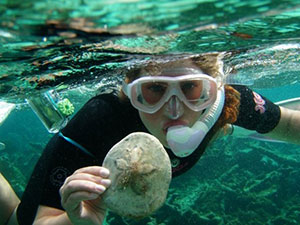
From climate change to water pollution, humans are altering natural systems in complex and unexpected ways. Understanding human impacts to these natural systems requires interdisciplinary analysis of complex problems. Earth and Environmental Sciences is a multi-disciplinary field that addresses the interactions between humans and the environment. Study in this field includes an understanding of the basic principles that govern geological, biological and chemical interactions, as well as development of solutions to current environmental problems.
About The Program
Earth and environmental sciences (EES) is a multi-disciplinary field that addresses the interactions between humans and the environment. Study in this field includes an understanding of the basic principles that govern geological, biological, and chemical interactions, as well as the applied context of developing solutions to current environmental problems.
The earth and environmental sciences curriculum is designed to provide a solid foundation in both earth science and environmental science and to support coursework in chemistry and biology. The B.A. program is designed to provide a broad background in the fundamentals of earth science for students who plan careers in secondary education, business, law, and other areas, or wish to pursue a double major. The B.S. program is intended for students who plan graduate work in earth or environmental sciences and thus require additional upper-level EES courses and additional preparation in mathematics. Those seeking secondary certification in earth science have additional course requirements and must plan a course of study in consultation with faculty advisors from both the Earth and Environmental Sciences and the Education Departments.
Majors: Earth and Environmental Sciences (BA, BS)
Minors: Earth and Environmental Sciences, , Marine Science
Chair: Dr. J. Christopher Haley
School: Joan P. Brock School of Mathematics and Natural Sciences
Why Study at VWU?
Marlins IMPACT Scholarship Program
The Marlins IMPACT Scholarship Program provides need-based scholarships for academically talented undergraduates majoring in STEM disciplines at VWU in a national effort to increase numbers of students graduating in STEM disciplines and joining the U.S. STEM workforce.
Accelerated Degree Options
Accelerated degree options are available which allow students to receive a Bachelor’s degree from Virginia Wesleyan and a master’s degree from a partner institution in five years. Current accelerated degree options for our majors include a Master of Forestry or Master of Environmental Management from Duke University and a Master of Engineering specializing in Environmental Engineering from Old Dominion University.
Master of Forestry or Master of Environmental Management from Duke University
The Cooperative College (3-2) Program allows students to proceed directly from three years of undergraduate study at Virginia Wesleyan University to two years of study at Duke University's Nicholas School's Master of Forestry (MF) or Master of Environmental Management (MEM) program.
Master of Engineering specializing in Environmental Engineering from Old Dominion University
The Pre-Engineering Program offers students the opportunity to earn both a Bachelor of Science degree from Virginia Wesleyan University and a Master's degree in Environmental Engineering from Old Dominion University.
Internships/Undergraduate Research
Earth and environmental sciences majors are offered the opportunity to conduct original scientific research in an area of interest. They work closely with a faculty mentor to develop and conduct a research project, then present their findings during the University’s Undergraduate Research Symposium. Students are also encouraged to present their findings at a conference.
Internships are an intensive study of a specific field of science through an on-site field experience with professional mentors. Past internship sites have included:
- NASA
- National Oceanic and Atmospheric Administration (NOAA)
- Chesapeake Bay Foundation
- Virginia Department of Environmental Quality
- Virginia Aquarium and Marine Science Center
Study Away

EES 375: Topics in Tropical Biology
Description: An intensive field experience in neotropical ecosystems (coral reef, rainforests, a cloud forest, mangrove swamps, etc.) that links ecological phenomena with social and historical factors to examine the conservation of biodiversity. Field activities require moderately strenuous exercise and considerable hiking. The course is open to both science and non-science majors.

ENVS 283: Seminar in Alaska: Sustainability
Description: The majestic landscape of southeast Alaska provides the backdrop for this field-based course and allows hands-on exploration of the complex relationships between people and environments. "Live the text" as you learn about climate change while walking on a retreating glacier, study the life cycle of salmon while rafting the Chilkat River, identify plants and animals during a hike through a temperate rainforest, and discuss ancient and contemporary concepts of sustainability with native Tlingit people.
Beyond the Classroom
Virginia Wesleyan graduates who earn a degree in earth and environmental sciences pursue careers in diverse areas such as environmental consulting, secondary education in earth science, environ mental education and outreach, and governmental agencies. In addition, graduates can pursue graduate studies in the areas of oceanography, meteorology, geology, environmental sciences and environmental engineering.

